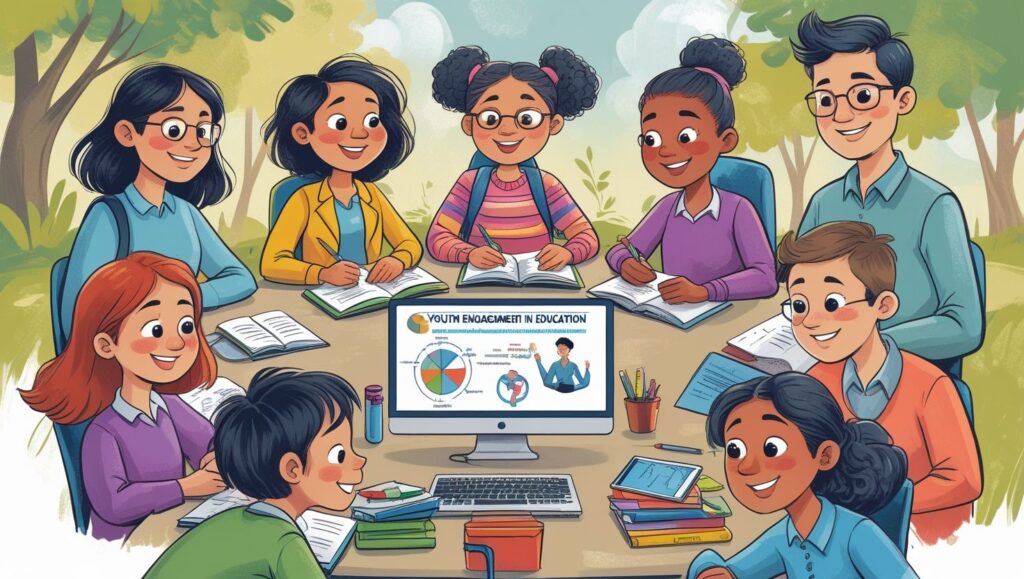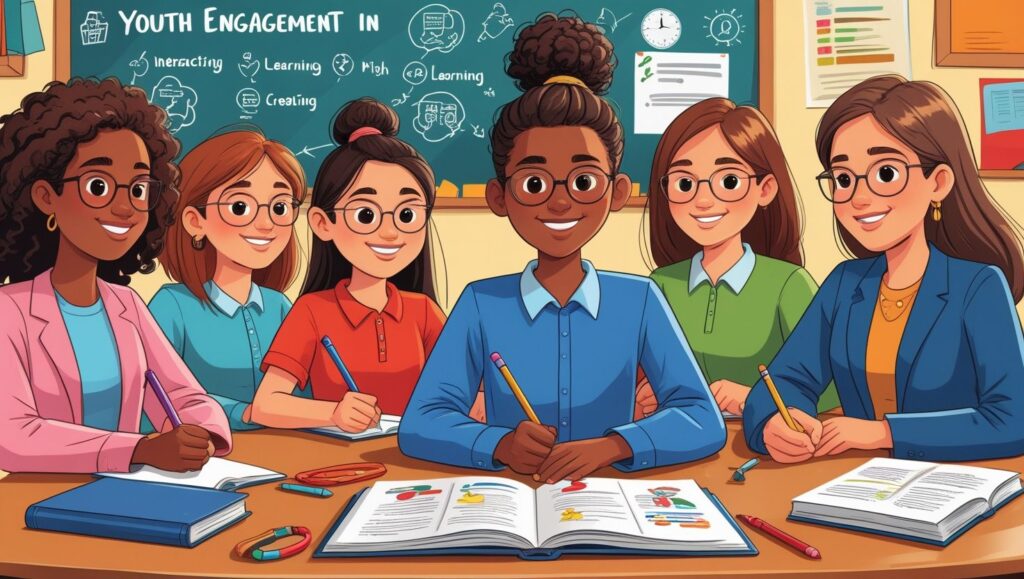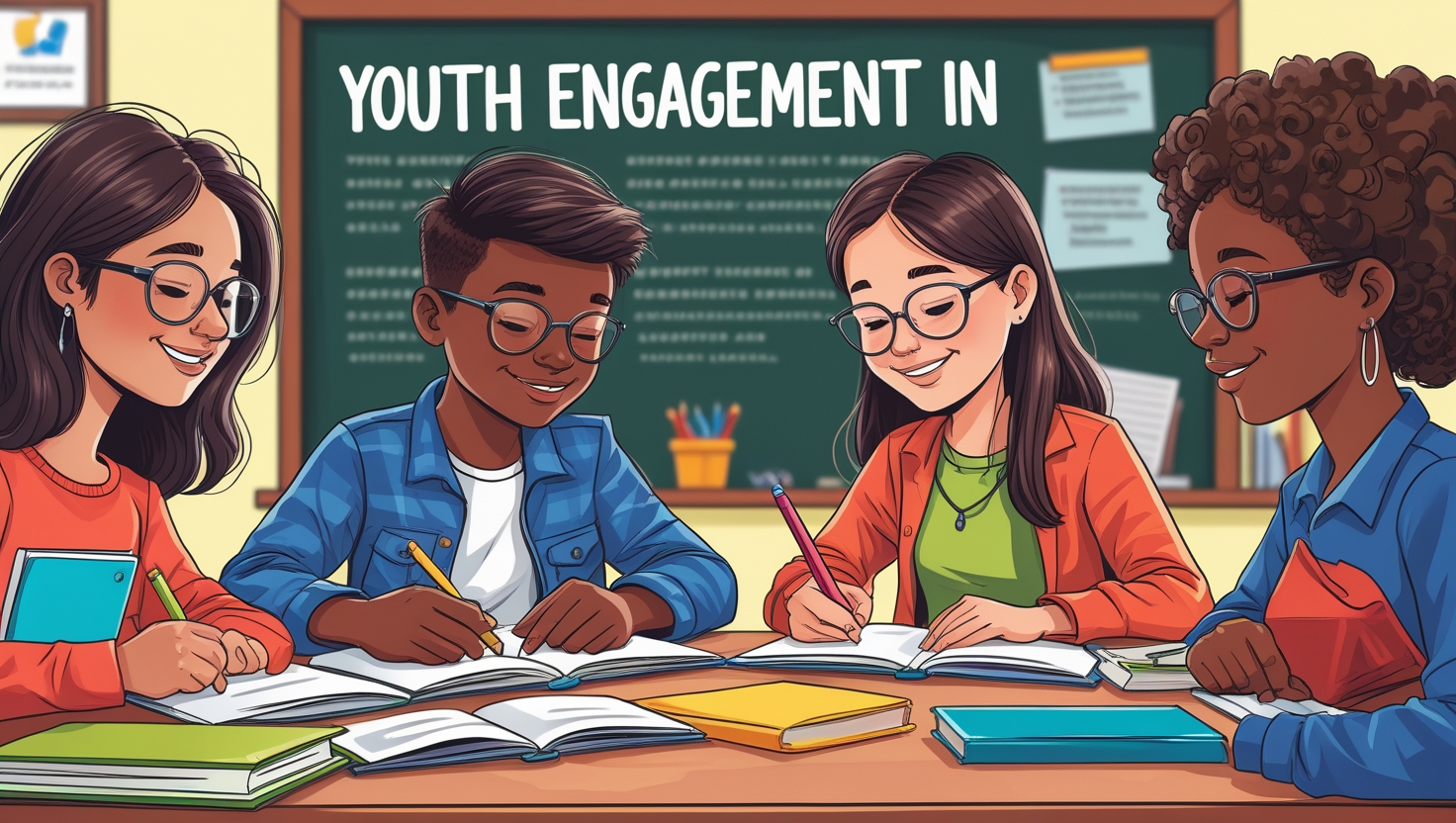Introduction
Youth Engagement in Education, Youth engagement in education is one of the most important aspects of national development. When students actively participate in their learning, they develop skills that extend beyond classrooms. They gain confidence, critical thinking, and problem-solving abilities. Moreover, youth involvement creates a sense of responsibility and ownership. However, many education systems still emphasize rote memorization instead of interactive learning. This approach discourages creativity and active participation.
Therefore, it becomes vital to reimagine learning environments that promote dialogue, collaboration, and innovation. Furthermore, educators must realize that young people learn best when they are motivated. Teachers, parents, and communities play essential roles in encouraging students to take part in school activities. Through engagement, young learners find education meaningful and relevant to their lives. Consequently, this motivation inspires them to contribute to society more effectively. Ultimately, engaged youth are better prepared for future challenges.
Importance of Youth Engagement in Education
The importance of youth engagement in education cannot be overstated. It fosters a deeper understanding of academic content while encouraging personal growth. Moreover, students who feel engaged in learning tend to achieve higher academic success. They remain motivated to attend classes, complete assignments, and participate in projects. Engagement also reduces dropout rates, which is a major challenge in many countries. In addition, it strengthens relationships between teachers and learners.
When young people feel their opinions are valued, they gain confidence to express themselves. This leads to improved communication and problem-solving skills. Furthermore, engaged students become more active citizens. They learn to collaborate, respect diverse perspectives, and work toward shared goals. In a rapidly changing world, such skills are essential for both personal and professional success. Hence, engaging youth in education is critical for building strong, progressive societies.
Strategies for Enhancing Student Participation
There are several strategies to enhance youth engagement in education. First, schools must adopt learner-centered teaching methods. Interactive approaches like group discussions, debates, and project-based learning encourage active involvement. Second, incorporating technology can make lessons more dynamic. Digital tools such as interactive platforms, videos, and simulations capture students’ attention. Third, extracurricular activities play a vital role. Sports, clubs, and arts allow young people to explore interests beyond academics.
Moreover, teachers should provide feedback that motivates learners. Constructive comments inspire improvement and foster confidence. Another effective strategy is peer learning. When students collaborate with classmates, they share knowledge and build teamwork skills. Furthermore, involving students in decision-making processes creates a sense of responsibility. For instance, school councils allow youth to voice their concerns and ideas. Ultimately, combining these strategies ensures a balanced learning environment. In turn, students feel motivated to participate actively.

Role of Teachers in Youth Engagement
Teachers hold a central role in promoting youth engagement. They act as facilitators who guide students through meaningful learning experiences. Moreover, teachers inspire curiosity by using creative teaching methods. By encouraging questions, they stimulate critical thinking and deeper understanding. Additionally, teachers must establish a supportive environment. When students feel respected and valued, they are more likely to participate. Furthermore, teachers can integrate real-life examples into lessons. This makes learning relevant to students’ experiences and interests. Teachers also need to recognize diverse learning styles.
Some students prefer visual learning, while others respond better to practical activities. By addressing these needs, teachers engage every learner. Feedback is equally important. Positive reinforcement helps students stay motivated and focused. Beyond academics, teachers serve as mentors. Their encouragement shapes students’ character and aspirations. Therefore, teachers’ efforts are crucial in sustaining youth engagement in education.
Role of Parents and Families
Parents and families play an equally important role in youth engagement. A supportive home environment enhances a child’s motivation to learn. Parents who show interest in school activities boost students’ confidence. Moreover, children are more likely to take education seriously when their families value it. Simple actions such as attending school meetings or helping with homework make a difference. In addition, parents can encourage healthy study habits. Setting routines and creating a quiet study space improve focus.
Furthermore, parents serve as role models. Their positive attitude toward learning inspires children to adopt similar values. Open communication is also vital. When parents listen to their children’s challenges, they provide emotional support. Collaboration between families and schools further strengthens engagement. When both sides work together, students feel encouraged from all directions. Ultimately, families play a critical role in shaping youth engagement and academic success.
Role of Technology in Engaging Youth
Technology has transformed the way students learn and engage in education. Digital tools offer interactive learning experiences that traditional methods cannot provide. For example, online platforms allow students to access information quickly. Moreover, multimedia resources like videos, podcasts, and simulations make lessons more engaging. Technology also supports collaborative learning. Students can work on projects with peers from different locations through digital tools. Additionally, gamification motivates learners by combining fun with education. Apps and games create challenges that keep students interested. Furthermore, technology helps personalize learning.
Adaptive software adjusts to individual needs, making learning more effective. However, it is important to use technology wisely. Excessive use may cause distraction instead of engagement. Therefore, teachers must guide students on responsible usage. Overall, technology provides countless opportunities to strengthen youth engagement. It bridges the gap between traditional education and modern learners’ expectations.
Extracurricular Activities and Engagement
Extracurricular activities significantly enhance youth engagement in education. They provide opportunities for students to explore talents outside classrooms. Sports, drama, music, and clubs develop creativity, leadership, and teamwork. Moreover, extracurricular involvement improves academic performance. Studies show that active students often perform better in school. These activities also reduce stress by offering a healthy outlet for energy. Furthermore, participation strengthens social skills.
Students learn to cooperate, resolve conflicts, and build friendships. Extracurricular activities also promote inclusivity. They bring together students with different interests and backgrounds. In addition, community service programs instill a sense of responsibility. Volunteering teaches youth the importance of giving back to society. Importantly, extracurricular engagement boosts self-confidence. When students succeed in these activities, they feel motivated to excel academically as well. Therefore, extracurricular programs are essential tools for keeping students engaged and balanced.
Challenges in Youth Engagement
Despite its importance, youth engagement in education faces several challenges. One major barrier is lack of resources. Many schools struggle with limited funding, which affects learning materials and extracurricular opportunities. Another challenge is outdated teaching methods. Traditional lecture-based instruction often discourages participation. Furthermore, social and economic issues affect engagement. Poverty, family problems, and health issues can limit a student’s ability to focus on studies.
In addition, technology misuse creates distractions. Social media and gaming sometimes reduce academic attention. Teacher-student relationships also play a role. Lack of encouragement from teachers may lower motivation. Moreover, cultural barriers sometimes prevent equal participation, especially for girls in certain societies. To overcome these challenges, collaborative efforts are needed. Governments, schools, parents, and communities must work together. Addressing these issues ensures that all students have equal opportunities for meaningful engagement in education.

Future of Youth Engagement in Education
The future of youth engagement looks promising with evolving educational trends. Schools are gradually shifting from traditional methods to interactive learning. Moreover, technology will continue to play a vital role. Virtual classrooms, AI-driven platforms, and digital tools will make education more dynamic. In addition, global collaboration will grow. Students will have opportunities to learn from peers across the world. Furthermore, personalized learning will shape future classrooms. Each student’s pace, style, and interest will be considered.
Teachers will focus on mentoring rather than lecturing. Additionally, extracurricular activities will expand, blending academic and personal development. Governments and organizations are also recognizing the importance of youth participation in policy-making. Therefore, education systems will involve students more in decision-making processes. Ultimately, the future holds great potential for engaged youth. Their active participation will build stronger, more innovative, and inclusive societies.
Conclusion
Youth engagement in education is fundamental for personal and social growth. Engaged students perform better academically, develop critical skills, and prepare for future challenges. Teachers, parents, and communities must work together to nurture this engagement. Moreover, technology and extracurricular activities provide additional support for active learning. However, challenges such as resource limitations and social barriers remain. Therefore, collective action is required to overcome these obstacles.
Importantly, the future of education promises greater opportunities for youth participation. Schools will continue to adopt interactive methods, personalized learning, and global collaboration. Ultimately, engaged youth are the foundation of progressive societies. Their energy, creativity, and determination shape the path toward sustainable development. By investing in youth engagement today, societies ensure a brighter, more inclusive tomorrow.
References
- Fredricks, J. A., Blumenfeld, P. C., & Paris, A. H. (2004). School engagement: Potential of the concept, state of the evidence. Review of Educational Research, 74(1), 59-109.
- Appleton, J. J., Christenson, S. L., & Furlong, M. J. (2008). Student engagement with school: Critical conceptual and methodological issues of the construct. Psychology in the Schools, 45(5), 369–386.
- Kuh, G. D. (2009). What student affairs professionals need to know about student engagement. Journal of College Student Development, 50(6), 683–706.
- Christenson, S. L., Reschly, A. L., & Wylie, C. (2012). Handbook of Research on Student Engagement. Springer Science & Business Media.

Simply desire to say your article is as surprising The clearness in your post is simply excellent and i could assume you are an expert on this subject Fine with your permission let me to grab your feed to keep up to date with forthcoming post Thanks a million and please carry on the gratifying work
My brother suggested I might like this blog He was totally right This post actually made my day You can not imagine simply how much time I had spent for this info Thanks
you are truly a just right webmaster The site loading speed is incredible It kind of feels that youre doing any distinctive trick In addition The contents are masterwork you have done a great activity in this matter
hiI like your writing so much share we be in contact more approximately your article on AOL I need a specialist in this area to resolve my problem Maybe that is you Looking ahead to see you
Ive read several just right stuff here Certainly price bookmarking for revisiting I wonder how a lot effort you place to create this kind of great informative website
hepbx3